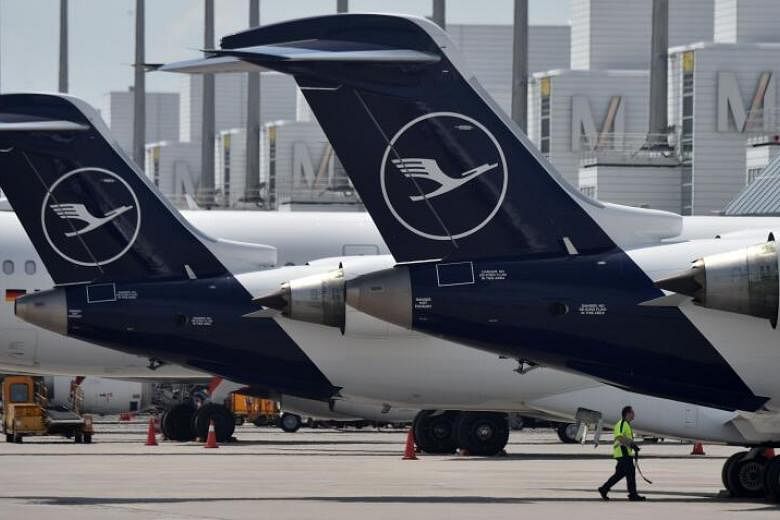LONDON - Most European countries will lift border controls by the end of this week, allowing the continent's battered airlines to resume continental flights.
But Europe's airline industry is likely to nurse its financial wounds for years to come and continue to be dependent on cash handouts from European taxpayers.
Furthermore, not all border restrictions are disappearing: Britain, home to London's Heathrow, Europe's biggest air hub, continues to remain an outlier by insisting on quarantine measures.
The damage to both the profitability and cash flows of European carriers due to the virtual cessation of air traffic on the continent because of the pandemic is considerable.
Airlines for Europe, the industry's regional association, said companies are facing a liquidity crisis unprecedented in passenger aviation's 100-year history. "Europeans are no longer able to travel, the vast majority of aircraft in Europe are grounded, the sale of air tickets has come to a nearly complete stop," it said.
Experts estimate that big national carriers such as Germany's Lufthansa, British Airways or Air France, which have high fixed costs and employ large numbers of people, never had more than five months' worth of financial resources to keep going in this revenue-free environment.
Europe's low-cost carriers - companies such as EasyJet, Ryanair or Wizz, which have revolutionised air travel in Europe - are leaner, so they can survive the lockdown for longer.
Still, all the carriers have already faced three months of an almost complete shutdown on air transport in Europe, with a total loss of revenue estimated at around US$85 billion (S$117 billion).
European governments have now bowed to the inevitable by rolling out large financial aid packages for the airline industry. And the European Commission, the European Union's executive body that usually takes a very dim view of such state handouts, has suspended normal state aid rules so that national governments can bail out their carriers.
Precise figures for the total subsidies offered to airlines across Europe are hard to compute, since some aid packages involve rolling out tax or other debt liabilities rather than straightforward cash handouts.
Still, the figures involved are considerable - in total, Europe's airlines have probably been offered aid packages totalling around €25 billion (S$39 billion), and the bailout process continues.
Unsurprisingly, much of this aid has generated political controversy.
Low-cost airliners are complaining that the bailouts favour national flag carriers. But they retort that low-cost airlines have also tapped into government soft-loan packages.
And although national carriers are in a precarious financial position, that does not prevent them from flexing their considerable political muscle.
Germany's Lufthansa, for instance, spent weeks refusing to accept a €9 billion offer of aid from its government, mainly because it was asked to give up in return some of its precious landing slots at Frankfurt and Munich airports to other companies.
While desperate for the bailout, Lufthansa did not want to give up its tight control over the German market, Europe's biggest.
And there were other controversies, such as the one generated by Britain's Mr Richard Branson who is fighting to save his teetering Virgin Atlantic enterprise with a request for around £500 million (S$883 million) in funding guarantees.
This met with fierce resistance, largely because the 69-year-old billionaire has spent years outside Britain, trying to limit his tax liability to the same government from which he is now seeking help.
Meanwhile, climate change campaigners say bailouts should only be given if airlines adopt new green technology and pay taxes on fuel as a condition for receiving taxpayer money.
Public bailouts must come with conditions "to slash the aviation sector's soaring contribution to climate breakdown", said Greenpeace.
But most governments are steering clear of this question for the moment as they are much more concerned with removing the last obstacles to renewed air traffic on the continent.
And at least in that respect, Britain seems to continue enjoying its splendid isolation. Despite the fact that the number of new coronavirus infections is, on average, higher than that reported in other European nations, the British government has imposed a 14-day quarantine requirement on all incoming foreigners, effective from the start of this week.
The government is now trying to secure so-called "air bridge" agreements with individual countries whose citizens may be able to come to Britain without quarantine, provided they flew non-stop from their countries.
Such deals are being discussed with all major European tourist destinations such as Portugal, Spain and France as well as Australia and Singapore.
But at least for the moment, the airline industry is furious with the authorities in London: British Airways, the national carrier, simply refused to attend a meeting called by its government to discuss the industry's future.












